What Are The Main DISC Personality Styles?
Adam Stamm
Managing Partner: Online DISC Profile
What are the four main DISC Personality Types?
William Moulton Marston theorized DISC in the 1920s in his book The Emotions of Normal People.
Marston wrote that you could identify a person based on their “primary emotions” and typical behavioral responses. Marston’s four behaviors laid the foundation for the four DISC personality types we know today.
However, it’s important to note that while Marston developed the initial theory, he was not responsible for the DISC Assessment we know today. Over the past 7 decades, numerous organizations and researchers have sought to understand personality.
DISC measures two primary scales of our personality, the most common areas affecting our communication and interpersonal relationships. You can see the two scales in the image below that are represented by two white lines that run horizontally and vertically:

The horizontal line on the DISC assessment matches almost precisely with the Big Five Personality assessment for the scale of Agreeableness. DISC asks a series of questions on this scale that determine a person’s relationship with society.
- Do you challenge new ideas or accept what others tell you?
- Do you find yourself empathizing with others or trying to dig deeper to understand the facts?


The Vertical line within the DISC Assessment roughly measures a person’s capacity for taking action or moderating risk.
Those who score at the top end of the scale likely prefer to take quick action rather than dig further into analysis.
Conversely, individuals who score at the lower end of this scale prefer more stable and predictable environments. They won’t take immediate action until they can understand the consequences.
These two scales create the four DISC Personality Types are:
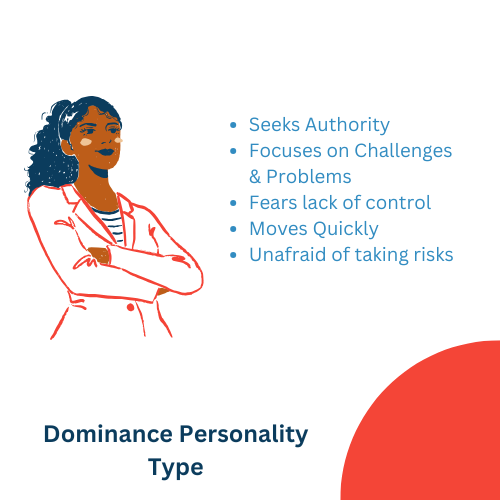
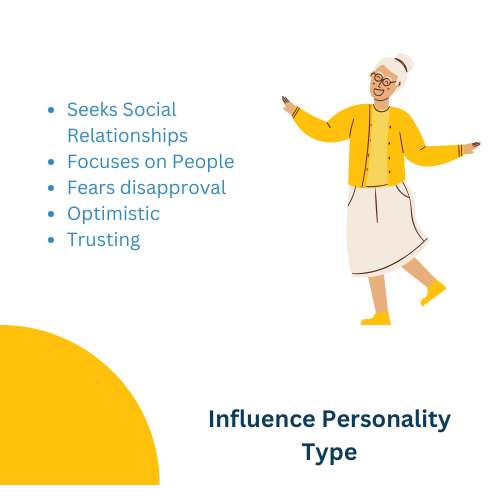
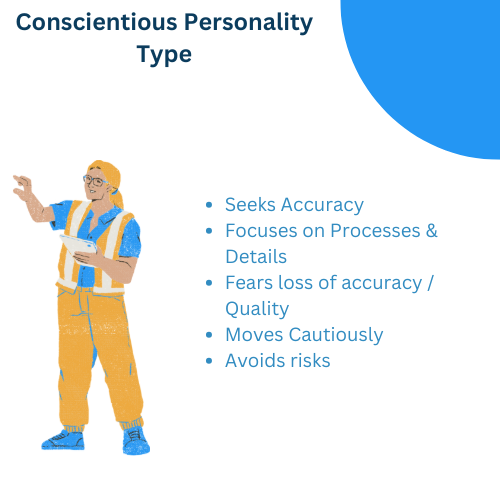
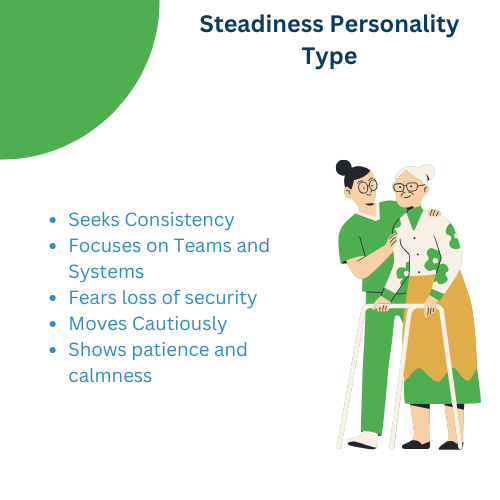
In this article, we will review each personality type. You can click on one of the styles to jump to the one you want to learn more about:
There is one more item that you should know about the four primary DISC Styles.
Marston believed that a person’s personality isn’t made up of a single style. Instead, he thought that we are a blend of all these styles, with a particular style that we naturally feature more than others. Marston used the image of a color wheel to describe his theory, saying that while one color best describes a person, you can still see evidence of the other colors.
Research has proven Marston’s theory. Today, know that 12 unique DISC Personality types are easily recognizable and measurable. While we all show our primary color, we have the ability to stretch our behavior towards other areas during certain social and emotional situations.
As the label suggest, most people that fall in this category have a dominant personality. Individuals with this style are:
- Direct
- Result-oriented
- Strong-willed
People with this style are likely to seek control of over situations and other people. They are highly skeptical and fast paced. Frequently, it’s noted that people with this style have little patience for people and situations that do not conform to their goals, beliefs, or preferences. As a consequence, they might become irritated or become argumentative more than the average person. They tend to be direct, if not blunt, with their opinions.
Without this style, our teams wouldn’t complete projects as quickly.
One of the best adjectives to describe this DISC style is outgoing. Individuals with this style are often found to be:
- Lively
- High-Spirited
- Enthusiastic
- Social
The largest behavioral difference that the I-Personality Type has is that they seek out social opportunities and generally talk more than the average person. Frequently, people in this style are very interpersonally positive. People of this style are often the first ones to a gathering and the last ones to leave. When asked to draw a picture that represents their style, this group frequently draws a martini glass to represent how social they are.
Without this style, our teams wouldn’t be as engaging.
People with the S Style are typically interpersonally warm. Frequently, they describe themselves as:
- Calm
- Peaceful
- Even-tempered
Patience is one of the largest differences that sets this style apart from the others. Frequently they are the counselors of any given group. They will listen patiently to what issues their co-workers or peers are experiencing, and they are generally interested in what others have to say.
Without this style, our teams wouldn’t feel as supported.
A person with the C Style is usually described as analytical. Along with being analytical, individuals with this style are:
- Private
- Accurate
- Reserved
People with this style will typically take more time on projects than others because they 1) want to understand as much as they can, and 2) ensure that any opinion or work they provide is accurate. They have a strong attention to details, and are frequently finding ways to be more systematic to ensure that they are being as accurate as possible.
Without this style, our teams wouldn’t be as accurate.
How to read your DISC Profile
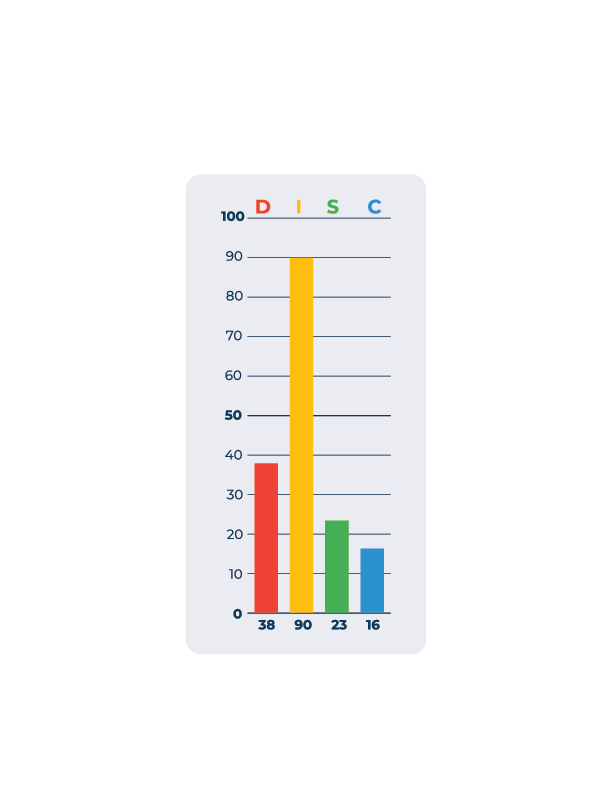
When you complete a DISC Basic profile, you will receive a chart that shows your DISC style along with a number score at the bottom of your graph for each primary style.
The higher your bar graph, the more inclined you are toward that particular style.
In this example, this individual is a highly inclined I Personality Type. Their DISC Profile shows a bar graph over the Influence scale that is much higher than any of the other styles.
At times, it’s possible for someone to have a combination profile where they have two DISC Types that are aligned with their personality.
The cut-off for being aligned with a style is indicated by a score of 50 (which you can see on the left side of this DISC Graph.
Is there a free DISC Assessment?
We believe in this tool so much that we have developed a free DISC profile that will identify your primary DISC Personality Type.
This report does not include your DISC Graph, but it will consist of your DISC Narrative to learn more about your DISC Personality.
Once you take the free DISC Assessment, you can upgrade it for $59.




